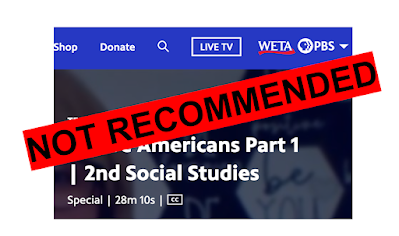A reader wrote to ask me about a video on PBS, titled
Native Americans, Part 1; 2nd [grade] Social Studies. I've loaded it and will watch and pause as I do to make notes here. The person in the video is a teacher, Mrs. Huson. She works in Missouri. The video aired on December 16, 2020 and is still available on the PBS site. I think this set of notes is going to make people feel bad for the teacher in the PBS video. She's doing what she thinks is good work and obviously someone at PBS thought so, too. But one minute after another, there are errors. (For those who don't know who I am, I'm tribally enrolled at Nambé Owingeh, was a schoolteacher and assistant professor in American Indian Studies, and now work as an educational consultant.)
At the 1:04 mark Huson asks "Have you ever heard of Native Americans? Do you know what a Native American is?"
Deb's notes: the teacher is assuming there are not Native children in the audience for the video. If questions like that are asked in an actual classroom, how does it land with children who are Native? Huson is speaking as if we no longer exist. That's a common misconception. In fact, we're still here, thriving as hundreds of tribal nations across the continent. Due to government programs, many of us were removed from our homelands. Today there aren't any Tribal Nations in Missouri, but if you're a fan of professional football, you may know that Native people attend mascot protests in Kansas City. We live all across the country. Do not assume that there aren't a Native children in your classrooms! You've been mis-educated to think we don't exist anymore, and that if we do, we have dark hair and dark skin -- but that's not true!
At the 1:14 mark, the teacher says "We're going to learn about Native Americans, who they were, and we're going to learn a lot about their culture."
Deb's notes: Two errors in that sentence: first, she used the past tense verb "were" as if we aren't here, today, and she used "culture." As I continue to watch, I wonder if I'll hear her use present tense verbs? Will I hear her use the word nation? A common mistake is to speak of us as cultures. We are people with distinct languages, songs, histories, stories (those are parts of cultures) but we are first, and foremost, nations of people. Remember learning about treaties? We were nations with leaders who negotiated treaties with leaders of other nations. We were nations before the US was a nation.
At the 1:53 mark, the teacher says "the settlers discovered the United States of America."
Deb's notes: There's a lot wrong with that phrase! For decades Native people have asked that people not use the word "discovered" to describe what happened. And, the land they arrived on--or invaded--was not called "the United States of America." That phrase (USA) did not come into existence until later.
As I continue to watch I see very broad definitions for words like "culture" and "tribe" and verbs the teacher is using are past tense. I understand she is pitching this to children in second grade but they're being given information that is reductive and most definitely not educational. She's speaking as if we're all the same. An example is what she says about totem poles. She's speaking as if we all carve them. We don't.
Her explanation of a powwow is a bit of a mess. She says it is a festival where Native people gathered to celebrate something. She talks about kids going to parties to celebrate birthdays as being similar to a powwow.
Oh.... dear. Tribes had chiefs, she says, and they were "extravagant headdresses" and tells students if they encounter a tribe (based on all she's said so far, I think she means "encounter" in a book rather than in person) you can tell which one is the chief by the headdress. No, no, no!
I can't go on. Pausing here. I don't know if I'll be back. I'm going to get in touch with PBS in Missouri. This is deeply problematic content and should not be on any website.


I contacted PBS about this video years ago, gave them a breakdown of what is wrong with it, and kindly asked them to remove it. Clearly they did not listen. I hope your voice is heard!
ReplyDeleteThanks for sharing this. I just watched the video and am speechless..
ReplyDelete